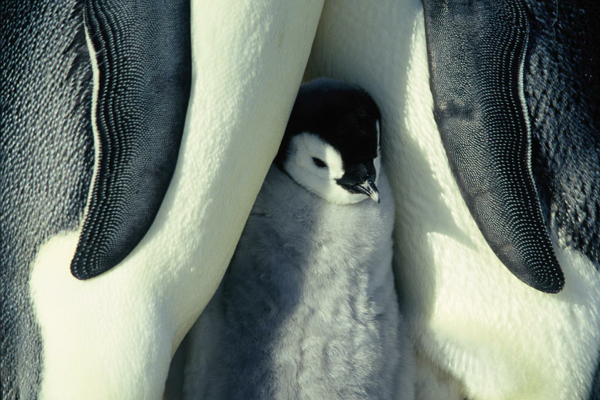Movie review by Greg Carlson
“March of the Penguins,” a grand nature documentary one might expect to find on the Discovery Channel, Animal Planet, or PBS, makes itself right at home on the big screen, due in large measure to its breathtaking, powerful images. Directed by Luc Jacquet, and originally titled “The Emperor’s March,” the movie is premised solely on the mating and reproductive cycle of emperor penguins in Antarctica. While the story strains a little too vigorously to humanize the fascinating creatures, the Herculean struggle of the birds to survive in the harshest conditions imaginable typically results in reactions ranging from wonderment to admiration.
The American version of the film, which is a few minutes shorter than the original French language edition, features a new score by Alex Wurman as well as new narration by read by Morgan Freeman. Fans of Gallic culture will want to seek out the earlier cut, as it uses actors Romane Bohringer and Charles Berling as the voices of two “romantically involved” penguins. Strange as that sounds, the technique diverges significantly from the calming, sober, and reassuring presence of Freeman. Freeman, as usual, is impeccable, but on occasion Jordan Roberts’ writing goes over the top in ascribing human emotion to the intriguing subjects of the film.
For the most part, Jacquet merely needs to witness the penguins’ fascinating rituals in order to provide the film with its central narrative. Waddling some seventy miles of glacial ice in single file in order to find a mate, the penguins immediately earn our attention and respect for their seemingly stubborn determination. It is difficult not to locate parallels between the penguins and ourselves, no matter how great the stretch. By the time the birds have produced eggs, which must be constantly protected from the bitter cold, most audience members will be caught up in the drama.
The cooperation of penguin mates in order to protect their offspring is another principal element of “March of the Penguins.” Once the females lay eggs, the parent birds perform a complicated ballet in which the delicate package is transferred from atop the feet of the mother to the feet of the father, who will warm the shell until it is ready to hatch. We are informed that the females have lost a third of their total weight in the process of producing the egg, and must return to open water in order to avoid starvation.
While the mothers are miles away filling their bellies in order to feed their progeny (a section of the movie that includes a series of jaw-dropping underwater shots of the aquatic birds effortlessly gliding after their prey), the chicks begin hatching, and the site of baby penguins proves difficult to beat in the cute department. Jacquet goes overboard with endless shots of the tiny comics learning to balance on the smooth ice, and no opportunity to musically punctuate the hilarious antics is wasted. Sophisticated viewers and ornithologists might take issue with the director’s liberal construction of continuity out of disjointed footage, but when the credits roll, and the filmmakers are shown braving the impossible, sub-zero conditions, one tends to cut them some slack.
